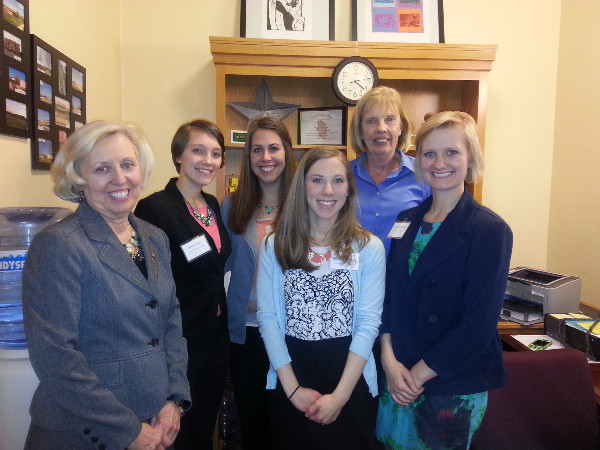
March 16, 2015
It is an honor to represent District 6 in the Kansas Senate.
If I can be of service to you or anyone you know, please call my office at 785-296-7375, or email me at pat.pettey @senate.ks.gov
In this issue:
• Three weeks left of regular session
• Block grant proposal passes House
• Changes to tax law considered
• Senate committee hears bill stripping bargaining rights
• Paycheck deduction bill heard
• Another property tax increase
• Renewable portfolio standard
• Fantasy football
• My thoughts
Three weeks left of regular session
Friday marked three weeks to go before first adjournment. Committees held hearings on bills, worked them, and passed many out of committee for consideration on the Senate floor. We also had several days of floor votes in the Senate, including the vote confirming Gov. Brownback’s second appointee to the Court of Appeals.
Block grant update
Friday was a sad day for Kansas kids as the House passed by just one vote SB7, repealing the current school funding law and replacing it with a block grant for two years. I received hundreds of emails from Kansans about SB7, and not one of them was in support of this legislation. There were thousands of calls Thursday night trying to get representatives to vote this bill down, but they just came up short.
Some of you may wonder what the “big deal” is about going to a block grant. Here is some background on that and my concerns about the block grant vs. the current formula.
Before the current school funding formula was put in place in 1992, property taxes for schools and per-pupil spending varied widely. Some districts were spending $2,000 per pupil and some $12,000. Some rural districts had mill levies of over 100 mills while urban schools taxed much lower. The current formula levels the playing field. Every Kansas student has access to about the same funding as the state “equalizes” payments to help the low-property value districts. It allows districts to add some local money through the Local Option Budget, but has a cap on that. The reason we have a lawsuit in court over school funding today is that the legislature failed to fund the formula to keep up with inflation, and did not make the equalization payments. The court, in fact, warned us not to mess with the formula before they made their ruling final.
The current formula provides extra funding for students who have extra costs (like tech ed or at-risk students). Schools get more money as student population grows. The block grant eliminates the safeguards and equalization the current formula has. The block grant forces school districts to raise property taxes by $33 million to recover the lost LOB equalization. That just puts us back in the old days where rural and poor districts will not be able to afford to educate their kids. And all of us will have higher property taxes.
The block grant was passed just one week after it was introduced. Very little debate. And even though the public was overwhelmingly against it, it passed. I know some of you think schools get enough money now, and that’s fine. This is not about “throwing money” at a problem. The bill cuts funding by over $50 million.
It’s been hard to dig through the whole bill and find out what it does besides cut funding, but here are some new details and changes made this week.
One good change that was made to the block grant bill in committee was to put new facilities funding back in. When you build a new school, the state helps you fund the equipment, desks, etc., needed to furnish it. This will stay in place until 2017.
The bill provides funding for virtual school students who don’t live in Kansas. The payment is even more than we provide for basic state aid for Kansas kids. This could be the mechanism used down the road to provide taxpayer funding for private schools and home schools.
Another good change was adding some funding back for students over age 18 who are trying to finish their high school diploma
Other bills last week
While the block grant bill took up most of the energy this week, there were hearings on other bills as well. Here are a few:
• The House heard a bill that would change hiring and benefits for state employees. It would allow agencies to convert jobs from classified (protected by civil service rules) to unclassified (hire and fire at will). The bill also limits shared leave, and pretty much eliminates the longevity bonus.
• A bill that would allow religious organizations at post-secondary schools to discriminate based on religion. In other words, if a person showed up at a meeting with a different belief than the group, that person could be rejected for membership.
• Gov. Brownback has tightened requirements for food stamps and cash assistance over the last four years. There is a bill that puts those restrictions into law and tightens them even more.
• The Senate tax committee heard a bill that would once again tax “passive” income. This could be something like the income a person makes for rental income. This would raise taxes by $65 million. This is one way to recoup the lost income from the governor’s 2012 tax cuts.
• Another bill scraps the Teacher of the Year program. Under the current program, recipients are picked by a large group of people from all walks of life. These teachers travel the state being mentors to other teachers. Under the new program, legislators would pick the winners who would get cash awards.
• The war on public employees continued as the Senate Commerce committee heard a bill that would make it illegal for union dues to be taken out of an employee paycheck. All other deductions like United Way would still be allowed. They also heard a bill that would eliminate the Public Employees Relations Board and limit what public employees could negotiate to just wages and hours.
• The Senate Tax committee also heard a bill that would raise property taxes by $45 million statewide by eliminating the exemption of the first $20,000 in home value when calculating the 20 mill state assessment for school funding.
More bills from last week
Renewable Portfolio Standard
The Kansas Legislature is attempting once again to eliminate the Renewable Portfolio Standard. This time the repeal would be effective Jan. 1, 2016. Senate Bill 253 and House Bill 2373 would eliminate the requirement for utility companies to show a renewable energy generation capacity of 15-percent by 2016, and at least 20-percent by 2020. Having the RPS is proof that the Kansas Legislature supports wind energy and the related jobs.
Gov. Brownback last year announced that he no longer supports RPS and was in favor of phasing them out, despite the fact that industry reports rank Kansas as fifth among states for wind energy-related jobs – more than 4,000 Kansans are employed in the industry.
I do not support the repeal of the RPS.
Fantasy Football
Fantasy Football fans in Kansas may soon have something to thank the Legislature for – a bill in the House would make it legal by changing the designation of Fantasy Football from a lottery to a game of skill. Under current law, Fantasy Football Leagues that disburse money as awards are considered lotteries and are therefore illegal.
My thoughts
There is a pattern in the bills that are now moving forward like SB7, they undermine public education and employee-employer relations. Many legislators say they support less government, but they are doing just the opposite. What they do support is less funding to support state responsibilities. You get what you pay for. Presently our schools out-perform 42 other states; our roads are some of the safest in the nation, our employees feel respected and valued.
The downward spiral that legislation this year is creating is not good for Kansas. It does not create a climate that will attract businesses or grow jobs.

